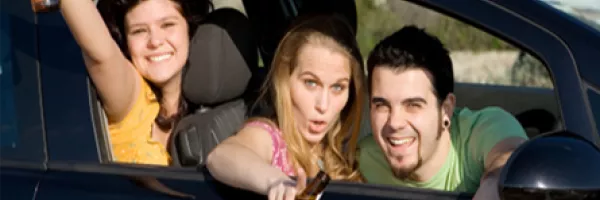
Help Your Teen Stay Safe and Sober This Summer
The beginning of summer is an exciting time for high school students, as they celebrate their accomplishments and kick off summer vacation. But at prom and graduation parties, and during the summer months when teens spend more time unsupervised, many teens put themselves at extreme risk by combining underage drinking with driving, making summer one of the most dangerous times for teen drivers and passengers.
Eight teens between the ages of 16 and 19 die in car accidents each day between Memorial Day and Labor Day, a period known as the 100 Deadliest Days for teens on the road. (Cars.com)
At this time of year in particular, it’s essential for teens to know the dangers of alcohol consumption. Let’s review some basic facts about alcohol, along with strategies for staying out of risky situations and how parents can help teens make smart decisions.
What’s the Danger?
False Perceptions About Alcohol
- In a survey sponsored by Students Against Destructive Decisions (SADD), 23% of teens admitted to having driven under the influence of alcohol or marijuana. (SADD)
- 11% of teens reported driving under the influence during the summer...
- 8% on the Fourth of July...
- 6% on prom night, and...
- 5% to celebrate graduation
- Of teens who drove while impaired, nearly 40% believe that alcohol has no impact on or actually improves their driving. (SADD)
Real Risks
- In reality, alcohol slows reflexes, decreases coordination, distorts sensory perception, and impairs your ability to focus and make decisions - in short, drinking eliminates your ability to drive safely. (Only the Strong Survive)(Mothers Against Drunk Driving)
- 4,700 young people between the ages of 15 and 20 die every year as a result of underage drinking. Of those deaths, 32% are traffic fatalities. (MADD)
- Teens are the least experienced drivers on the road, and are the most vulnerable to the effects of alcohol. This is why the minimum legal drinking age is 21, and why all 50 states enforce zero tolerance alcohol laws for drivers under 21. There is no safe amount for teens to drink, whether or not they are driving. (Only the Strong Survive)(MADD)
How Do I Stay Safe?
Don’t Drink
- The only way to completely avoid the risks that come with alcohol use is to choose not to drink alcohol, and avoid situations where underage drinking is taking place.
- It may be tough to say “no” to your friends, but there are plenty of ways to refuse alcohol, and the more you practice these skills the easier it will get. (Only the Strong Survive)
- Consider hosting your own drug and alcohol free prom or graduation party! The National Highway Traffic Safety Administration provides a guide to planning substance-free events, such as a graduation night party for your whole class!
Make a Plan
- Agree on a plan for prom and graduation celebrations with friends and parents to make sure everyone stays safe. (Only the Strong Survive)
- Decide who will be driving to and from your destination in advance.
- Bring extra cash to take a cab home in case your safe ride home falls through.
- Agree to call your parents or a trusted adult for a ride if you find yourself in a dangerous situation. They may be disappointed, but they’d rather you stay safe!
- Driving drunk or getting in a car with a drunk driver is never an option.
Graduated Driver Licensing
- Follow your state’s graduated drivers license laws, which are designed to give teens experience driving before introducing hazardous conditions such as nighttime driving and driving with teen passengers. (MADD)
- These laws reduce crash risk by 20 to 50%. (NHTSA)
Never Drive Distracted
- When meeting up with friends or driving to an unfamiliar location, it might be tough to resist calling for directions or texting your friends for an update, but the distraction makes your reaction times as slow as those of a drunk driver and increases your crash risk dramatically.
- Always stop your vehicle in a safe place before using your phone, or ask a passenger to call or text for you.
- Don’t hesitate to turn down the music or ask your passengers to quiet down when you need to concentrate!
How Can Parents Help?
Talk About Alcohol
- The most important thing parents and caregivers can do is to talk to their children about alcohol. More than 80% of children say parents are the biggest influence in their decisions about drinking. (Substance Abuse and Mental Health Services Administration)
Talk Early and Often
- Start talking to your kids about alcohol early, and keep talking as they get older. Lots of short conversations are more effective than one “big talk.” MADD offers conversation starters for parents, tips to handle tough questions, along with steps to take at home to help your teen stay safe.
Be a Responsible Host
- Abide by social host liability laws, which hold adults responsible for underage drinking on property they control, regardless of who provided the alcohol, and even if adults are not present. (MADD)
- Private homes are the most common setting for drinking among high schoolers, but supervising teen drinking doesn't reduce the dangers - parents can’t see everywhere at once, and parties can quickly spiral out of control.
And remember - even though you have made the wise decision to never drink and drive, drunk drivers are still out there, especially during the summer months. Make sure you and your teen know how to spot a drunk driver, and what to do if they (or you) see one!